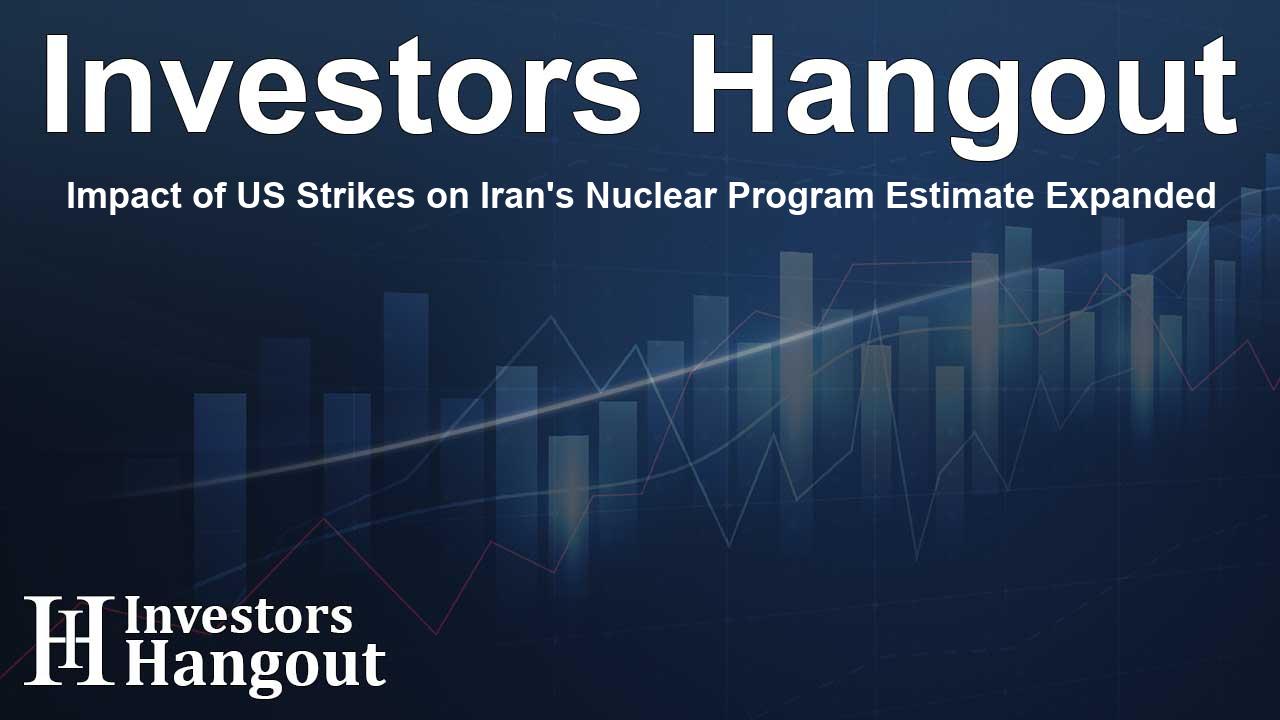Impact of US Strikes on Iran's Nuclear Program Estimate Expanded

US Strikes' Estimated Impact on Iran's Nuclear Program
The Pentagon recently stated that U.S. strikes on Iranian nuclear facilities have caused a substantial setback for Iran's nuclear ambitions, projecting a delay of up to two years. This assessment highlights the critical implications of the military operation and its enduring impact on international relations.
Details from the Pentagon's Assessment
In a press briefing, Pentagon spokesman Sean Parnell mentioned that while the official estimate is 'probably closer to two years', no specific evidence was provided to back this assessment. He indicated that intelligence evaluations within the Department of Defense are in consensus on the significant degradation of Iran’s program, asserting, 'We have degraded their program by one to two years.'
Overview of the Strikes
The military action took place on June 22, involving U.S. B-2 stealth bombers manufactured by Northrop Grumman Corp. These bombers targeted several key nuclear facilities in Iran, specifically at locations known as Fordo, Natanz, and Esfahan.
Contrasting Intelligence Evaluations
This claim by the Pentagon stands in stark contrast to previous leaked assessments from the Defense Intelligence Agency, which suggested that the strikes would only postpone Iran's nuclear ambitions by just a few months. Secretary of State Marco Rubio defended the effectiveness of the operation, emphasizing the devastating impact on Iran’s conversion facility at Esfahan, stating, 'Everything underneath that mountain is in bad shape.'
Geopolitical Significance of the Strikes
The airstrikes followed a period of heightened conflict between Israel and Iran, starting June 13, during which Israeli forces targeted Iranian nuclear sites, alleging that Tehran was nearing the production of nuclear weapons. Iran retaliated with missile strikes before the United States' direct involvement, highlighting the escalated tensions in the region.
CIA's Position on the Damage
Director of the Central Intelligence Agency, John Ratcliffe, affirmed that the strikes inflicted severe damage on Iran's nuclear program, citing 'credible evidence' of the destruction of critical facilities. Despite this, Rafael Grossi, head of the International Atomic Energy Agency, has indicated that Iran could reboot uranium enrichment operations within a matter of months, keeping the risk of nuclear proliferation alive.
Market Response and Predictions
The potential for a ceasefire has generated positive responses in the markets. Analyst Dan Ives from Wedbush Securities described the ceasefire between Iran and Israel as 'the most bullish outcome' for Wall Street, forecasting gains of 2-3% for major indices.
Stance of Iranian Officials
In response to the military actions, Iran's Deputy Foreign Minister Majid Takht-Ravanchi stated that the U.S. must provide assurances against further military operations prior to resuming nuclear negotiations. The Iranian Ambassador to the UN, Amir-Saeid Iravani, reiterated that Iran's uranium enrichment efforts will continue unabated, asserting it as an 'inalienable right' under the Nuclear Non-Proliferation Treaty.
Insights into Northrop Grumman Corp
As the manufacturer of the bombers used in the strikes, Northrop Grumman Corp (NOC) plays a pivotal role in U.S. defense strategies. Understanding the market implications of such military actions may provide insights into the future performance of defense contractors, particularly in the context of increasing global tensions.
Frequently Asked Questions
What was the Pentagon's recent assessment of the strikes on Iran?
The Pentagon indicated that U.S. strikes have delayed Iran's nuclear program by up to two years, based on internal intelligence assessments.
What facilities were targeted during the U.S. strikes?
The strikes targeted three significant nuclear facilities located at Fordo, Natanz, and Esfahan.
How did the strikes affect the market response?
The market reacted positively, with analysts predicting 2-3% gains for major indices, viewing the ceasefire potential favorably.
What are Iran's current positions regarding uranium enrichment?
Iran's officials, including the Deputy Foreign Minister, have stated that uranium enrichment will continue, emphasizing their rights under international treaties.
What role does Northrop Grumman Corp play in U.S. defense?
Northrop Grumman is a key defense contractor, notably providing the B-2 bombers used in recent military operations, influencing U.S. defense capabilities and strategies.
About The Author
Contact Caleb Price privately here. Or send an email with ATTN: Caleb Price as the subject to contact@investorshangout.com.
About Investors Hangout
Investors Hangout is a leading online stock forum for financial discussion and learning, offering a wide range of free tools and resources. It draws in traders of all levels, who exchange market knowledge, investigate trading tactics, and keep an eye on industry developments in real time. Featuring financial articles, stock message boards, quotes, charts, company profiles, and live news updates. Through cooperative learning and a wealth of informational resources, it helps users from novices creating their first portfolios to experts honing their techniques. Join Investors Hangout today: https://investorshangout.com/
The content of this article is based on factual, publicly available information and does not represent legal, financial, or investment advice. Investors Hangout does not offer financial advice, and the author is not a licensed financial advisor. Consult a qualified advisor before making any financial or investment decisions based on this article. This article should not be considered advice to purchase, sell, or hold any securities or other investments. If any of the material provided here is inaccurate, please contact us for corrections.
